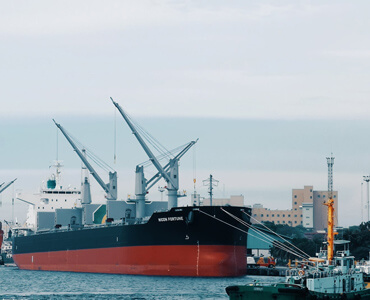As Globelink Ünimar, we provide seaway transportation services with our expert staff, with the purpose of forming a connection between every important port in the world and in Turkey.
By ensuring professional, reliable and economical service standards in export and import; through our extensive international network, we provide the punctual transportation service required. We conduct regular weekly sea freight services as FCL and LCL depending on your needs and oversee the proper transportation method with our expert staff.


Seaway Transportation
As one of the leading sea freight companies, while providing economical services required by major transportation needs with our innovative systems and advanced network capabilities; we demonstrate our quality standards by customer-based reporting.

As Globelink Ünimar, a sea freight company that provides direct service to 40 internationally valued ports, we play the role that connects our associates with the world through maritime transportation.

Some of the basic sea freight services we provide consist of:

FCL Container, Import/Export Transportation
LCL (partial) Container, Import/Export Transportation
Costumer-based reporting services
Key Account Administration
Regular Weekly Expeditions
Indirect Transit Transportation Through Turkey
Special Container Options (Opentop, Flatrack, Reefer, ISO tank, Flexi, etc.)
Documentation Delivery on Time
Fast, Reliable and Economical Service
Sea transport systems by ship are based on two basic transportation methods.


These systems are named as FCL Container and LCL (partial) Container.
While these two systems both represent transportation of cargo, they differentiate in ways of distribution. Globelink Ünimar has a reliance-based performance on providing transportation methods required by the customer and carrying the operation exactly as desired.
FCL (Full Container Load)
FCL (Full Container Load), represents major scaled transportation between ports. In FCL, all the cargo transported in a container is owned by a singular customer. Since loading the whole cargo at once reduces the cost of storage in the economic sense, this method of transfer is preferred by companies that carry major delivery operations to ports.
LCL (Less Container Load)
LCL (Less Container Load), on the other hand, represents the partial usage of the container. In LCL, the container contains different goods from several owners. This method of transfer is preferred for its economic advantage based on the quantity of the commodity as it shares the transportation cost between the cargo owners. As Globelink Ünimar, we provide the best budgetary solutions while fulfilling your transit or route-based direct transfer needs with our private network using LCL as one of the sea transportation types. While providing service with our wide agency network, we optimize the LCL transportation in the best way for our associates and carry the operation with ideal punctuality.

There are approximately
4.600 ports across the world.
100 of these ports possess global value and significance in the international economy.

Since direct partial service is not possible to conduct mutually through all these ports in transportation by sea, some ports with wider cargo space are used as a transshipping port or a “HUB”.

Through transferring operations carried in these ports, LCL service can be provided for more ports of destination. These transshipping ports hold a global value as they enable LCL operations to be carried extensively due to their locations. Some critically positioned HUBs that enable LCL operations can be listed as Singapore, Port Klang, Hong Kong in the Far East; Dubai in the Middle East; Hamburg, Rotterdam, Antwerp, Barcelona, Genoa in Europe; New York and Miami in America. The wide network and extensive service potential of Globelink Ünimar ensure the punctual delivery of major container transfers to the location of your choosing. We highly value matters that determine the quality of services such as punctuality, safe transfer and timely documentation delivery while conducting a connection between you and capital ports as well as transshipping ports.

In conclusion, for any line of work you are in, we treat the economic utilities and safety that you require in transportation with great sensitivity.
There are approximately a hundred ports across the world that possess economic value and more with geographical importance in between these ports.
15.320,125
+
Mil Yol Gittik
725
+
Dünyanın Çevresinde Dolaştık
120.000
+
Mutlu İş Ortaklarımız

While we provide you with the fast, reliable and economic opportunities required in import and export, we also organize the operational process to your advantage as well.
As Globelink Ünimar, we provide container transportation services to the main 40 of these ports directly with the LCL container system in order to ensure transportation services to important locations without any waste of time in export. In order to carry out imports economically and at the ideal time, we provide LCL container service to 43 ports in Turkey. Our successful operations in partial shipping are also serviced in FCL transfers as well. Thanks to our local and global contracts with major import and export ship owning companies, we apply our high-quality service standards on FCL transporting as well.


In addition to the demonstration of our high-quality services in international sea freight, we also create solutions on various loading models
by providing transformation methods specialized by the requirements of our customers.
Some of the models we provide for various import and export requisitions can be listed as:

Open Top Containers
Open Top Containers are designed in a way that enables its top part and front door to be opened fully. As these containers are designed to allow placement of bigger objects that cannot fit through the regular entrance, an awning that is supported by bars is placed on the container after the wares are placed through the top.
Reefer Containers
Reefer Containers are preferred for their cooling features. While these containers are mainly used for the transportation of food, they are also valued by pharmaceutical industries as well. As Globelink Ünimar, we provide our food and pharmaceutical industry costumers with the opportunity to transfer their delicate cargo fresh with our Reefer Containers.
Flatrack Containers
Flatrack Containers are used for the transfer of goods that are not possible to fit in regular containers due to their height or width. As this type of container has open spaces on its sides and top in addition to a front door, it can be used to carry major scaled construction equipment and generators. As one of the leading maritime transportation companies, we provide our customers with the service to transport their construction equipment all over the world with our Flatrack Containers.
Flexitank Containers
Flexitank Containers are used to transport liquids that can be labeled as dangerous of the chemical industry. With specialized layers on the interior and the exterior surfaces of the container, these are used to transfer liquid-formed products of our customers from chemical and petroleum industries.
Isotank Containers
Isotank Containers are used to transport absorbed or liquefied gasses that can be labeled as dangerous. We provide your international transfer needs with these containers that are valued for their contribution to the development of import and export in the energy and chemistry industries.
Customer services by making fast
Unique as You
In addition to the service given to our customers by our expert staff and operational teams, we place high importance on giving the information and details they require about maritime transportation.
Our Key Account administration department provides specialized services to each individual customer through the management of the operational process, system integration and documentation.Providing unconditional customer services by making fast, reliable and punctual documentation deliveries is another one of our primary policies.



